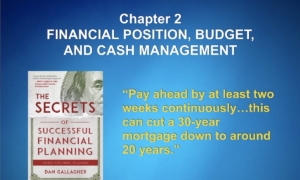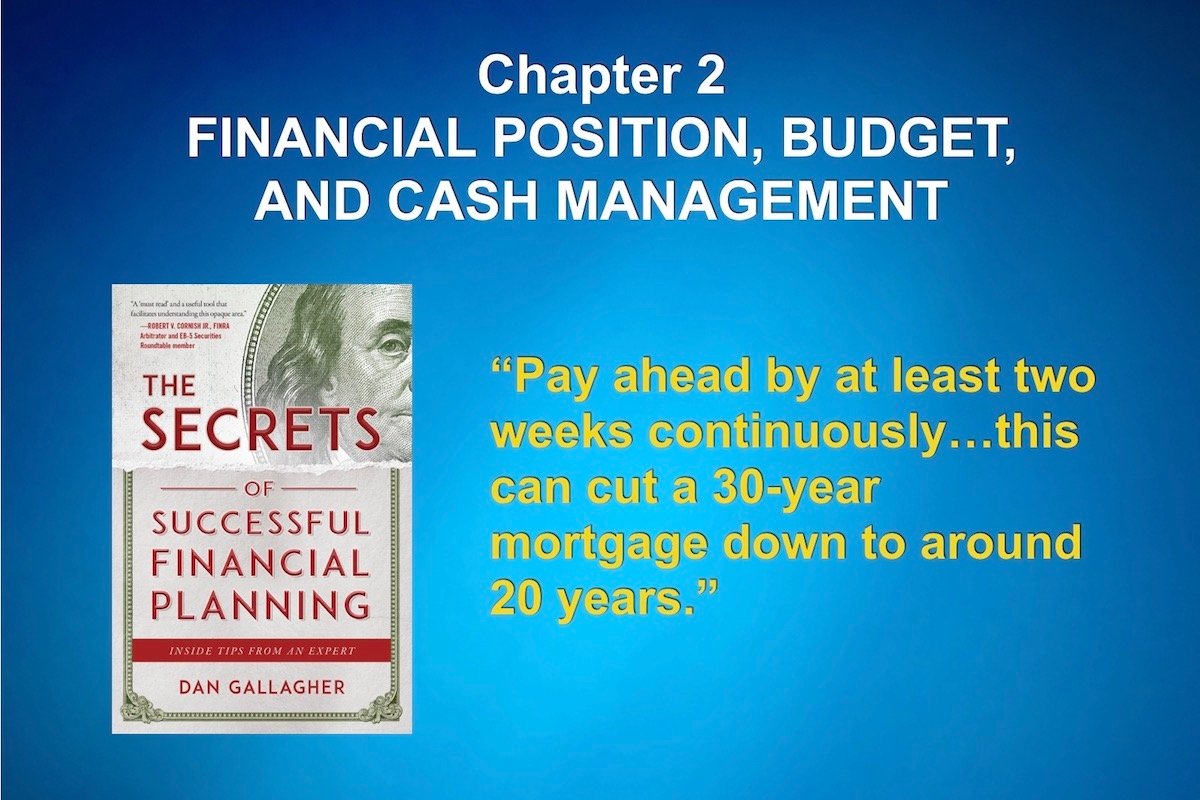Inside Tips From an Expert (Part 2)

Three-Tiered Cash Reserves
You don’t need a financial advisor to know you need a cash reserve. But how that is assembled profoundly affects your chances of success. Optimally, you should use three tiers and assemble a special kind of budget in order to estimate how much cash to place in each. You will need this structure regardless of whether you are young, approaching retirement, or long-since retired.
Tier 1 is the type most people think of: totally liquid cash. Resign yourself to scant return because you keep moving money in and out, and no institution will pay much on that. The purpose is to place money there for a month or two, tops— money that is actually spent on monthly expenses, then replenished with earnings or other income. Keeping this down to known expenses for two months is important because the return will be so low. Use a checking account and perhaps also a money market fund. Often a fine deal can be had with a money market fund that earns enough interest to cover checking fees or get them waived. Even if you use a credit card for groceries, this fund pays off the charges before interest is applicable. Be sure to read the credit card terms to know when interest is actually applied! This fund is for known, repeating expenses, plus an extra month’s worth for modest discretionary expenditures.
Tier 2 is for expenditures that you can reasonably measure if you keep a budget that shows intended expenditures versus actual expenditures. The extra expenditures represent either spending you should consider trimming or expenditures you know are likely to occur sometime during the year, yet are not precisely known as to amount or timing.
Examples of items to place in the budget include maintenance on your vehicle, taking visitors out to eat, replacement of things that generally take a year to wear out, and vacations.
Tier 3 covers contingent expenses or outlays that have a reasonable probability of occurring, but might actually never occur. It is a ten-year fund (covering from the end of Tier 2’s time horizon out to ten years). Because you might never need to access this fund, it should be exposed to whatever market risk you are willing to incur, but not as much as for funds destined for long-term goals.
Notice that filling these tiers cannot happen without income that exceeds expenses. Also notice that a cash reserve is the base support for risk management on the pyramid of financial stability and success.
Debt Strategy
Here is a tip on mortgages, so common early in a marriage but persistent throughout life: As soon as you are able, start making one or two extra payments per year and do so regularly. The best technique here is to first insist that the lender write the promissory note with this term: The date of receipt of any early payment should be credited on that date, or at least the expected principal portion. Then, pay ahead by at least two weeks continuously. Depending upon which of the foregoing crediting methods you can negotiate into your note, this can cut a thirty-year mortgage down to around twenty years, merely because you keep reducing the principal slightly every payment date. Actually, most refuse, crediting principal either once yearly or on a set date each month, negating the early payment effect. Some lenders might agree, though, in a competitive loan underwriting situation. Today, most lenders offer something like this in two versions of a promissory note you can pick. The common practice amounts to an extra payment per year, and cuts four years off a thirty-year mortgage. There are two problems:
1. The early payment effect is replaced by the extra-payment effect (pay 26 half payments per year, which equals 13 in a year).
2. You must make these payments and commit to missing none of them (the 25th and 26th payments are not optional). Banks figured this out many years ago when people began to make 24 payments per year, but made them early so as to reduce the principal ahead of the interest calculation; now banks want the exact amount of interest no matter what (unless you can negotiate from strength).
You might have seen ads for companies that act as middlemen to accomplish nearly the same effect. These are mostly legitimate, but there are two risks: First, the company might pay less in years when their profit margin is stressed. Their fine print will allow this for their protection. So, though they will not short you, they may fail to deliver on the ad hype and you can end up with an early payoff, but not as early as projected. The second risk is that your payments become the company’s own money; it is obligated to pay the lender, but it is still subject to potential embezzlement (unlikely, but possible). Were that to happen, remember that you remain obligated to pay the lender even if your middleman goes bankrupt or experiences some sort of embezzlement.
The safest early payoff method, short of making one or more extra payments per year, is to refinance when rates get low. Try also to pay any mortgage down after eliminating nondeductible debt, of course. But beware of a trap: refinancing another time for the same old term (number of years). You will just keep extending the date when you would be free of the mortgage!
Credit and debit cards are very convenient, and provide more security than using cash. Issuers in the US and Canada now provide $50,000 of protection against fraudulent use of your data or card, provided that you report suspicious transactions within a reasonable time, generally the billing. This phrase “reasonable time,” though, varies by lawyers’ favorite term, “facts and circumstances.” An example simplifies: You’re mugged, and you notice that your debit card has been stolen while you’re speaking with police in an emergency room where your cuts and bruises are treated. You are tired and shaken emotionally, but you did not bother to report this upon your return home, where you have a working phone. Instead, you reported it after lunch the next day, but a thousand-dollar charge was made just before lunch. An argument could be made by your creditor that you failed to report the theft at your first reasonable opportunity, which would reasonably have been when you arrived home. “I told the police,” you might argue and they would cancel it for me. You might win in a court fight with the creditor, maybe, but do you really want to be in that fight? Besides, maybe the police were too busy that morning; you could have called the card company while waiting in the emergency room. Never go longer than a billing cycle before checking every line item on your bill!
Credit card purchases, as distinct from debit card use, give you the false sense that there is not much owed. This occurs because people’s focus is always on the most recent purchase, rather than the many that came before. Soon, what you owe can get out of hand.
Even if you have great self-discipline about paying most or all of your balance monthly, here is one mistake that is easy to make, yet you must avoid it: Never think of your credit accounts, whether an equity credit line or an ordinary credit account, as part of your cash reserve.
The reason many do that is because it can be used when you are in a bind, such as being out of work for several weeks. The big failure in thinking of the account this way is that you begin to think that you don’t really need as big a cash reserve as I prescribed earlier. In a serious income pause, this thinking can lead to serious consequences, even bankruptcy.
Other leverage cautions: Did you know that almost all commercial loans, and most commercial real estate loans and lines of credit, are callable? This means that under circumstances of tight economic conditions—and even if you are paying these faithfully—these loans can be demanded to be paid up in a much briefer time than originally scheduled! If you are not a merchant or business person, this may seem like it does not affect you. What if your employer is a small business, say an RV dealership, and it suffers going into a recession? No problem, you might say: “I’m their top sales rep or their essential operations manager.” Fine, but the business itself could be forced to liquidate. The more at-risk your employer, the larger your cash reserve should be.
Few residential mortgages and lines of credit are callable due to economic conditions, but they all are in event of sixty to ninety days of default (depending upon your promissory note provisions). Also, every one is callable in event of failure to have adequate (defined in the note) homeowner’s insurance, failure to pay real estate taxes, and failure to maintain the house. Imagine that you have a storm and notice that your roof leaks badly afterward. The insurance carrier sends an inspector, whose photos show that prior damage existed that left the roof more susceptible to the storm. Claim denied. Now you are in a dispute with your insurance company over whether the roof’s leaking is covered. Impossible? It happened to me, and it did not matter that I was unaware of the prior compromise of the roof. So, the carrier denies your claim because you did not deal with the earlier leak that got worse in the storm. Now you must personally fork over $12,000 or so for a new roof. How could the mortgage company learn of this? Surely you have plenty of time and the mortgage company will not accelerate (call) the loan if you must delay getting a new roof! Well, the carrier drops you because of the earlier failure to maintain the roof (all policies do allow this). No, I’m not kidding: All policies give the carrier the option to non-renew (sometimes to drop you with sixty days’ notice) if they determine that your level of maintenance of the home increases their risk. The carrier informs the mortgage company, and will do so in every such case.
What other less-than-obvious threats to your budget and net worth are waiting to bite you? Losing statements, disorganization, and keeping outdated materials can be a problem, at least in costing you time with a financial planner who might charge to help organize. Archive old records; label them as archived. Keep a notebook with in-force policies and investments and other statements. Transfer statements to archive once they are a year old, but keep the current ones and the original descriptive materials in the “current” folder. Keep summary plan descriptions from employee benefits, wills, Social Security statements, etc., in this current folder.
Such a folder can help in emergencies, too, from deaths to benefits claims. These documents need not be duplicated and placed in a fireproof box, but a list that includes the wills and where to get replacement documents should be so protected. This folder can also speed your discussions with a financial planner, at least to keep you and your heirs organized when documents are needed. Consider keeping these items in a fireproof safe or a bank safe deposit box, plus a listing in your home or office for quick reference. Hold on to your W-2s and pay stubs to verify your employment history to avoid problems from an employer’s mistaken or lost work records (crucial if you ever need to double-check pension and Social Security benefits). Retain employee benefit plan documents, including benefit statements, notices, and your summary plan description.
Likewise, don’t borrow from your retirement plan, as this can be a double whammy of tax taken out automatically if the IRS deems necessary in the very year you have lower earnings; it could even place you in a higher tax bracket if the unpaid loan is big enough.
This excerpt is taken from “The Secrets of Successful Financial Planning: Inside Tips From an Expert,” by Dan Gallagher.
To read other articles of this book, click here .
To buy this book, click here.
The Epoch Times Copyright © 2023 The views and opinions expressed are those of the authors. They are meant for general informational purposes only and should not be construed or interpreted as a recommendation or solicitation. The Epoch Times does not provide investment, tax, legal, financial planning, estate planning, or any other personal finance advice. The Epoch Times holds no liability for the accuracy or timeliness of the information provided.




